
The Society of the Cincinnati is a hereditary society with branches in the United States and France, founded in 1783, to preserve the ideals and fellowship of officers of the Continental Army who served in the Revolutionary War. Now in its third century, the Society promotes the public interest in the Revolution through its library and museum collections, publications, and other activities. It is the oldest hereditary society in America. Although restricted to lineal male descendants, there is a partnership society called Daughters of the Cincinnati which permits all female descendants of Continental officers.
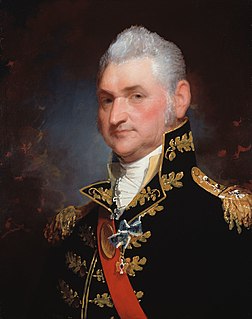
Henry Dearborn was an American soldier and statesman. In the Revolutionary War, he served under Benedict Arnold in the expedition to Quebec, of which his journal provides an important record. After being captured and exchanged, he served in George Washington's Continental Army, and was present at the British surrender at Yorktown. Dearborn served on General Washington's staff in Virginia. He was US Secretary of War, serving under President Thomas Jefferson from 1801 to 1809, and served as a commanding general in the War of 1812. In later life his criticism of General Israel Putnam's performance at the Battle of Bunker Hill caused a major controversy. Fort Dearborn in Illinois and the city of Dearborn, Michigan, were named in his honor.

Rufus King was an American lawyer, politician, and diplomat. He was a delegate for Massachusetts to the Continental Congress and the Philadelphia Convention and was one of the signers of the United States Constitution in 1787. After formation of the new Congress he represented New York in the United States Senate. He emerged as a leading member of the Federalist Party, serving as the party's last presidential nominee in the 1816 presidential election.

John Canfield Spencer was an American lawyer, politician, judge and United States Cabinet secretary in the administration of President John Tyler.
Nathan Brownson was an American physician and statesman. He served Georgia as a delegate to the Continental Congress in 1777 and as the Governor of Georgia in 1781.
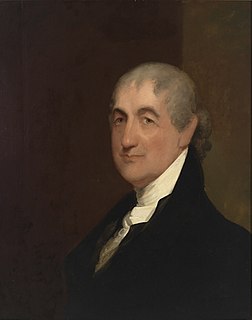
Caleb Strong was a Massachusetts lawyer and politician who served as the sixth and tenth Governor of Massachusetts between 1800 and 1807, and again from 1812 until 1816. He assisted in drafting the Massachusetts State Constitution in 1779 and served as a state senator and on the Massachusetts Governor's Council before being elected to the inaugural United States Senate. A leading member of the Massachusetts Federalist Party, his political success delayed the decline of the Federalists in Massachusetts.

John Holmes was an American politician. He served as a U.S. Representative from Massachusetts and was one of the first two U.S. Senators from Maine. Holmes was noted for his involvement in the Treaty of Ghent.
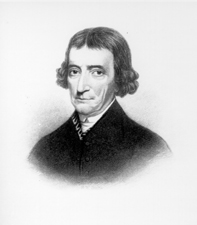
John Chandler was an American politician and soldier of Maine. The political career of Chandler, a Democratic-Republican, was interspersed with his involvement in the state militia during both the American Revolutionary War and the War of 1812.
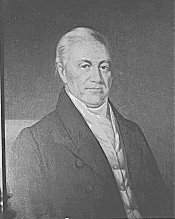
Benjamin Pierce was a colonial soldier in the American Revolution and an American Democratic-Republican politician. He was the father of Franklin Pierce, the 14th President of the United States. He served as Governor of New Hampshire from 1827 to 1828 and from 1829 to 1830.
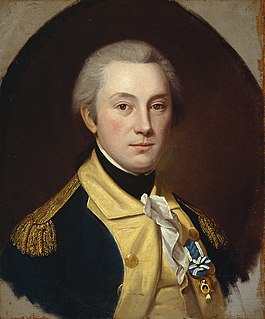
William North was an American soldier and politician.
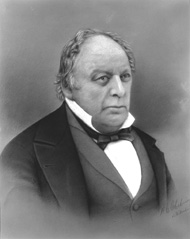
Alexander Parris was a prominent American architect-engineer. Beginning as a housewright, he evolved into an architect whose work transitioned from Federal style architecture to the later Greek Revival. Parris taught Ammi B. Young, and was among the group of architects influential in founding what would become the American Institute of Architects. He is also responsible for the designs of many lighthouses along the coastal Northeastern United States.

John Brooks was a doctor, military officer, and politician from Massachusetts. He served as the 11th Governor of Massachusetts from 1816 to 1823, and was one of the last Federalist officials elected in the United States.

Thomson Joseph Skinner was an American politician from Williamstown, Massachusetts. In addition to service as a militia officer during the American Revolution, he served as a county judge and sheriff, member of both houses of the Massachusetts legislature, U.S. Marshal, and member of the United States House of Representatives. He served for two years as Treasurer and Receiver-General of Massachusetts, and after his death an audit showed his accounts to be deficient for more than the value of his estate, which led to those who had posted bonds on his behalf having to pay the debt.

Henry Jackson was a Continental Army officer from Boston, Massachusetts during the American Revolutionary War. For most of the war he was colonel of Jackson's Additional Continental Regiment, which was redesignated the 16th Massachusetts in 1780. He commanded the last regiment of the Continental Army, the 1st American, which was disbanded in 1784. Jackson was a lifelong friend of Henry Knox another Continental Army officer, whose business affairs he was also heavily involved in.

The Marquis de Lafayette was the last surviving French general of the American Revolutionary War in 1824, and he made a tour of the 24 states in the United States from July 1824 to September 1825. He was received by the populace with a hero's welcome at many stops, and many honors and monuments were presented to commemorate and memorialize the visit.
David Poe Jr. was an American actor and the father of Edgar Allan Poe.

Brig. Gen. James Appleton was an American abolitionist, early supporter of temperance, and politician from Maine.
William Augustus Miles was an English political writer. He was also a British agent in the years around the French Revolution.

Edward Roche was an American merchant who served in both houses of the Delaware General Assembly, as a delegate to the Delaware state constitutional convention, and in the American Revolutionary War.
Asa Clapp was an American merchant and politician.















